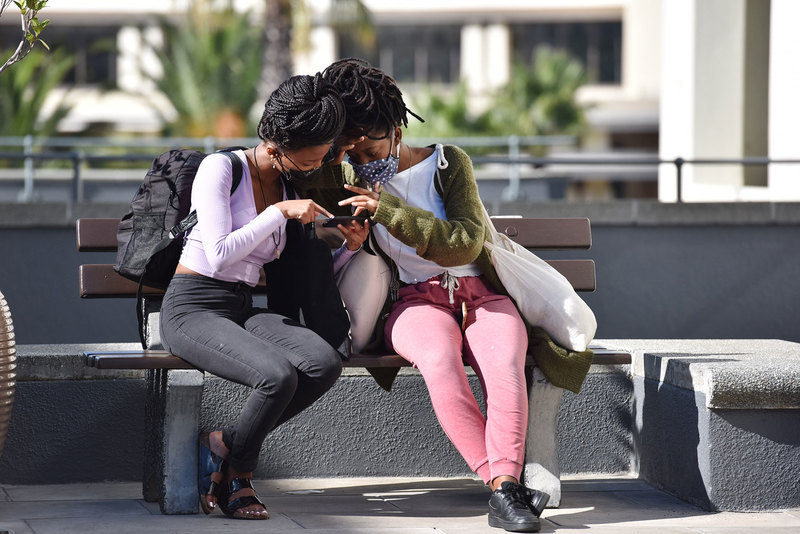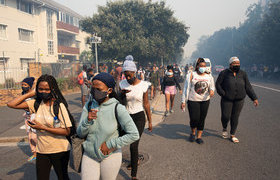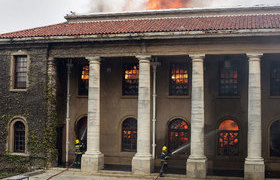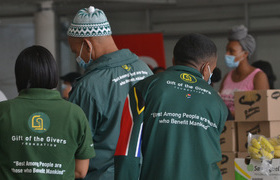UCT fire: collaborative effort to support displaced students
21 April 2021 | Story Nadia Krige. Photo Lerato Maduna. Read time 7 min.
A massive collaborative effort involving staff members, the Students’ Representative Council (SRC), fellow students, civil society organisations and various hotels across the city is under way to accommodate and support University of Cape Town (UCT) residence students who have been displaced after a wildfire left parts of upper campus gutted on Sunday, 18 April.
Evacuation of UCT residences started at around 11:30 on Sunday morning after a wildfire that had broken out on the slopes of Devil’s Peak earlier that morning raged towards upper campus, engulfing the entire area in a cloud of smoke and ash.
Tim Low, the assistant warden of Kopano residence and senior lecturer in Mathematics and Statistics at UCT’s Centre for Higher Education Development (CHED), has been on the ground to assist displaced students since Sunday, and recalled an atmosphere of panic and chaos.
“Most students had gone down to Main Road, making their way to the Mowbray bus station where Jammie Shuttles were deployed to transport them to various assembly points,” he said.
Initially these points included the Protea Hotel by Marriott Cape Town Mowbray, as well as UCT’s Hiddingh Campus in Gardens and the UCT Graduate School of Business (UCT GSB) at the Victoria & Alfred Waterfront.
Port of call
UCT GSB leaders and staff members, as well as management from the neighbouring Protea Hotel by Marriott Cape Town Waterfront Breakwater Lodge, rallied to put contingency plans in place, with the GSB Academic Conference Centre quickly becoming the main port of call for displaced students.
“We received 650 students on Sunday and another 450 to 500 on Monday,” said Kumeshnee West, the director of Executive Education at the GSB. “From here, we then placed them at different hotels that are able to accommodate them.”
Initially there were four hotels providing accommodation for displaced students: Protea Hotel by Marriott Cape Town Waterfront Breakwater Lodge, The Westin Cape Town, Protea Hotel by Marriott Cape Town Victoria Junction, and Protea Hotel Fire & Ice! Cape Town.
This number has increased to more than 20 across the city.
“When the students arrive here at the GSB, we check them in, take their temperatures, check which res they’re from, try to feed them and encourage them to relax a little bit until we find a place to send them,” said Low.
The power of the collective
Due to the urgency of the situation, many students left their residences with nothing but the clothes on their backs, resulting in an additional need for toiletries, clothing and snacks.
“As a collective – the students, some of the leadership team and myself – we started putting out calls for necessities on social media,” said West.
Within no time donations were streaming in, transforming the GSB Academic Conference Centre into a hive of activity where a team of student volunteers have been hard at work sorting and distributing items. The volunteer effort is being driven and overseen by the SRC.
“What we’re doing is trying to get toiletries and snack packs to students at the various hotels,” said Vuyi Qotoyi, the chairperson of the SRC’s Constitutional Committee. “We’ve also received clothes donations, so we’re trying to put outfits together for students. Every student should be getting at least one outfit.”
“We still need things like toothpaste, deodorant and face cloths. Clothing donations would also be very welcome.”
In the meantime, Gift of the Givers has also been working tirelessly to provide all displaced students with nutritious meals.
West said that there is still a particular need for toiletry donations.
“We have been fortunate to receive an abundance of sanitary pads – more than 5 000 packs, in fact – but we still need things like toothpaste, deodorant and face cloths,” said West. “Clothing donations would also be very welcome.”
Low added that many students are suffering from allergic reactions to the smoke and ash, and that there have been numerous requests for antihistamines.
Mental health support
While the physical safety of displaced students has been a priority in the wake of the evacuation, the Student Wellness Service (SWS) is ensuring that mental well-being is also taken care of.
UCT peer and volunteer counsellors have been stationed at each of the hotels to support students.
“Truly speaking, most of the students we have here are not okay,” said Busi Kokolo, an SWS peer counsellor who has been deployed at the Southern Sun Waterfront hotel.
Most of the students being accommodated at this hotel are first-years from Fuller Hall, which was badly damaged by the fire.
“On the first day they didn’t really have time to process everything, but now things are really catching up with them,” said Kokolo.
Hanske Flieringa, a volunteer counsellor from UCT’s Occupational Therapy division, said that many of the students are traumatised and anxious that they will be expected to hand in assignments as usual next week.
“They’ve lost everything, and don’t know how to cope,” she said. “We are trying to provide some solution by just listening to their stories. In situations like these, it always helps to have someone who listens without judgment.”
A number of non-profit organisations have also stepped up to the plate to offer mental health support to students. One of these is Fund Social Good. They have been offering mindfulness-based group trauma relief sessions at the various hotels.
“A session lasts about 30 to 40 minutes and includes a bit of stretching, because the body stores a lot of tension,” said Refilwe Mofokeng, the director of Fund Social Good. “We then take them through some breathing exercises and end off with a mindfulness practice.”
Founder, Desigan Pillay, added that one of the most important aspects of these sessions is the fact that it starts with a “check-in”, where students can share how they’re feeling and voice their opinions.
“Having a space where they feel like they’re being listened to is so important,” he said. “And it also gives them the opportunity to realise they’re not alone.”
Resources
Displaced students who need mental health support can sign up for counselling and mindfulness sessions at the front desk of the hotel at which they have been placed. They can also book online counselling sessions with the SWS. For more information, students should follow the UCT Peer Counsellor Instagram page.
Donations may be dropped off at the GSB Academic Conference Centre at the Breakwater Campus. Items that are needed include:
- face cloths
- toothbrushes
- toothpaste
- deodorant
- clothing
- fruit and other snacks
- water.
 This work is licensed under a Creative Commons Attribution-NoDerivatives 4.0 International License.
This work is licensed under a Creative Commons Attribution-NoDerivatives 4.0 International License.
Please view the republishing articles page for more information.










